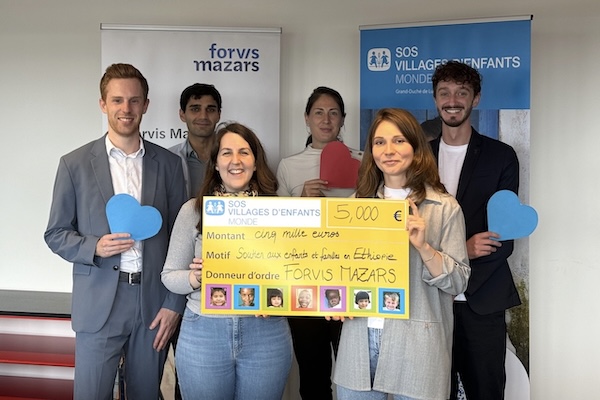 Credit: SOS Villages d’Enfants Monde
Credit: SOS Villages d’Enfants Monde
On Tuesday 22 July 2025, Luxembourg non-profit organisation SOS Villages d’Enfants Monde announced that it received a donation of €5,000 from employees at Forvis Mazars for its development projects in Southern Ethiopia.
SOS Villages d’Enfants Monde reported that on 31 May 2025, around 20 employees from the audit and consulting firm Forvis Mazars took part in the 18th ING Night Marathon in Luxembourg City. This marked the fourth consecutive year where the Luxembourg office of the company has partnered with the humanitarian organisation for the marathon.
The participants’ efforts resulted in a donation of €5,000, which will support, as they did in 2024, a humanitarian project responding to a prolonged drought in southern Ethiopia. According to the NGO, the drought has severely affected pastoral communities, leading to child malnutrition and widespread food insecurity. Over three years, Forvis Mazars has raised a total of €12,532 for communities on the brink of famine - whether in southern Madagascar or the Oromia region of Ethiopia.
Celebrating the runners’ success, Forvis Mazars’ Shadow Board - a group of young employees involved in shaping the company’s strategy - welcomed SOS Children’s Villages World’s Partnerships Manager, Anne Schweizer, and Communications and Fundraising Officer, Lisa Forrler, to their Luxembourg offices on Wednesday 9 July, for the presentation of the donation cheque.
At the presentation, the representatives from SOS Villages d’Enfants Monde shared updates on the Ethiopian project and outlined a new three-year resilience initiative, which aims to build on previous efforts in the region. They thanked the Shadow Board and praised the runners for their commitment.
SOS Villages d’Enfants Monde stated that the €5,000 donation will go directly to the ongoing project in the southern Oromia region, which began in 2023. Run by the local SOS organisation, the project has already improved health and nutrition for young children and for pregnant and breastfeeding women. It has also helped protect displaced women, restore livelihoods and improve food security through sustainable gardening (including growing moringa trees and nutrient-rich vegetables), goat rearing, beekeeping and selling products at market. Additionally, families have benefited economically through the creation of savings and credit groups.









